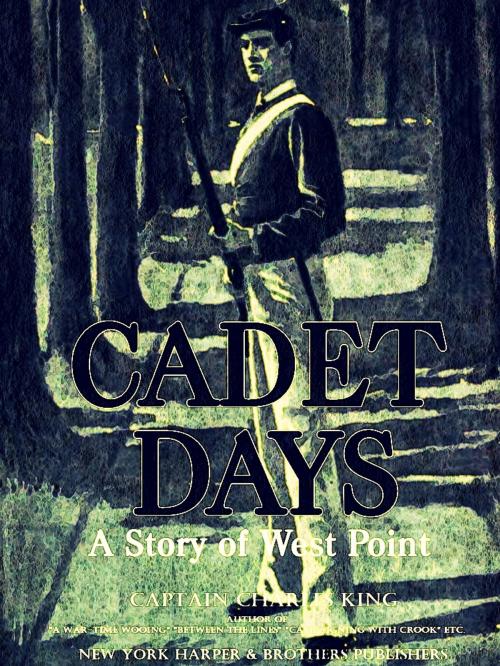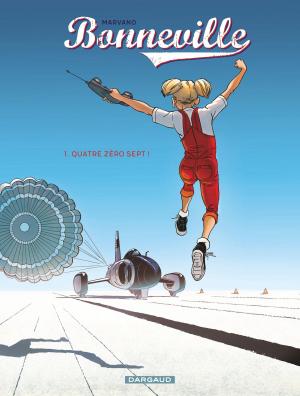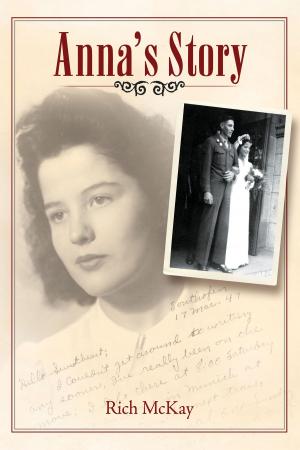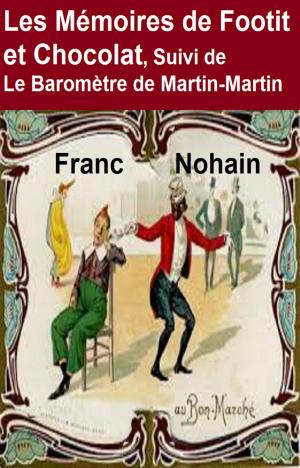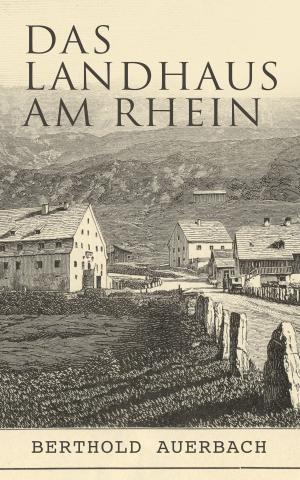Cadet Days
A Story of West Point (Illustrations)
Fiction & Literature, Westerns, Classics, Historical| Author: | King Charles | ISBN: | 1230000525855 |
| Publisher: | NEW YORK HARPER & BROTHERS PUBLISHERS | Publication: | July 2, 2015 |
| Imprint: | Language: | English |
| Author: | King Charles |
| ISBN: | 1230000525855 |
| Publisher: | NEW YORK HARPER & BROTHERS PUBLISHERS |
| Publication: | July 2, 2015 |
| Imprint: | |
| Language: | English |
Example in this ebook
CHAPTER I
"Pops, there's no use talking; we've simply got to send you to the Point."
"I'm sure I wish you could, Colonel. Father's tried every way he could think of, but cadetships don't go a-begging—out here, at least. The President has only one or two 'at large' appointments this year, and there were over a thousand applications for them."
"Well, have you tried Mr. Pierce, the Congressman for this district?"
"Oh, yes, sir, tried him long ago. He was very polite—Congressmen always are. He asked me to go round and get all the signatures to my application I possibly could, and kept me running for six weeks or so. Then he gave it to Mr. Breifogle's son."
Colonel Belknap smiled. "Yes, I remember hearing," said he, reflectively, tapping his spurred boot-heel with his riding-switch and critically eying the sturdy young fellow who stood respectfully before him. George Graham, the post surgeon's eldest son, was just seventeen, of medium height, wiry and athletic in build, with deep chest and broad shoulders, with close-curling brown hair, with big, frank, steady blue eyes, and a complexion that was probably fair enough in his baby days, but now was so tanned by sun and wind that the down just sprouting on his cheeks and upper lip seemed almost white by contrast. A picture of boyish health, strength, and activity was "Geordie," as his mother ever called him in vain protest against the familiar "Pops" by which he was generally hailed—a pet name given him by the officers when he was but a "four-year-old," far out in Arizona—a boy who had been reared in the West, whose first playmate was a wild little Apache, whose earliest friends were the rough troopers at an isolated station; a boy who had been taught to hunt and trail and shoot the Indian arrow before he was nine; who had ridden "pony-back" across the continent from Arizona to Kansas with a cavalry column before he was ten; who had stalked an antelope along the Smoky Hill before he was twelve; who had shot a black bear in the Yellowstone Mountains when he was only fifteen; and raced a buffalo bull into the fords of Milk River within sight of the British possessions across latitude 49 within the following year. He had met and mingled with Indians of many a tribe. He had picked up something of the Apache tongue from his playmate Dick; had visited the Navajo Reservation, near old Fort Defiance, in New Mexico, and brought away as his very own one of their wonderful woven blankets. He had learned not a little of the sign-language, and so was able to communicate and make himself understood among even the Cheyenne urchins around Fort Supply. After that his father had been stationed just long enough at Niobrara to enable Geordie to feel quite at home among the Ogallala and Brulé Sioux, whose reservations were just across the Dakota line, and whose visits to the post were frequent. Then the doctor was ordered far up to Fort Assiniboine, where Pops expected to freeze, but found the summer days as hot as they were in Arizona, and the mosquitoes worse than they were at Supply. There he studied the Northern Indians, and came to the conclusion that the Blackfeet and Gros-Ventres could not be compared favorably with the lithe and sinewy and marvellously active Indians of Arizona. Geordie swore by the Apaches. There were no trailers like the Tontos; no bowmen or ball-players like the Hualpais. The Sioux and Cheyennes could ride, perhaps, but all the Sioux in Dakota could not whip Eskeldetsee's band "if you put 'em in the mountains"—which was probably true. And so by the time he was seventeen Geordie had ridden, marched, or travelled by ambulance, stage, or rail through most of the great Western States and Territories; but from the time he was four years old he had never been east of Omaha, or set foot in the streets of a bigger town than Cheyenne.
To be continue in this ebook
Example in this ebook
CHAPTER I
"Pops, there's no use talking; we've simply got to send you to the Point."
"I'm sure I wish you could, Colonel. Father's tried every way he could think of, but cadetships don't go a-begging—out here, at least. The President has only one or two 'at large' appointments this year, and there were over a thousand applications for them."
"Well, have you tried Mr. Pierce, the Congressman for this district?"
"Oh, yes, sir, tried him long ago. He was very polite—Congressmen always are. He asked me to go round and get all the signatures to my application I possibly could, and kept me running for six weeks or so. Then he gave it to Mr. Breifogle's son."
Colonel Belknap smiled. "Yes, I remember hearing," said he, reflectively, tapping his spurred boot-heel with his riding-switch and critically eying the sturdy young fellow who stood respectfully before him. George Graham, the post surgeon's eldest son, was just seventeen, of medium height, wiry and athletic in build, with deep chest and broad shoulders, with close-curling brown hair, with big, frank, steady blue eyes, and a complexion that was probably fair enough in his baby days, but now was so tanned by sun and wind that the down just sprouting on his cheeks and upper lip seemed almost white by contrast. A picture of boyish health, strength, and activity was "Geordie," as his mother ever called him in vain protest against the familiar "Pops" by which he was generally hailed—a pet name given him by the officers when he was but a "four-year-old," far out in Arizona—a boy who had been reared in the West, whose first playmate was a wild little Apache, whose earliest friends were the rough troopers at an isolated station; a boy who had been taught to hunt and trail and shoot the Indian arrow before he was nine; who had ridden "pony-back" across the continent from Arizona to Kansas with a cavalry column before he was ten; who had stalked an antelope along the Smoky Hill before he was twelve; who had shot a black bear in the Yellowstone Mountains when he was only fifteen; and raced a buffalo bull into the fords of Milk River within sight of the British possessions across latitude 49 within the following year. He had met and mingled with Indians of many a tribe. He had picked up something of the Apache tongue from his playmate Dick; had visited the Navajo Reservation, near old Fort Defiance, in New Mexico, and brought away as his very own one of their wonderful woven blankets. He had learned not a little of the sign-language, and so was able to communicate and make himself understood among even the Cheyenne urchins around Fort Supply. After that his father had been stationed just long enough at Niobrara to enable Geordie to feel quite at home among the Ogallala and Brulé Sioux, whose reservations were just across the Dakota line, and whose visits to the post were frequent. Then the doctor was ordered far up to Fort Assiniboine, where Pops expected to freeze, but found the summer days as hot as they were in Arizona, and the mosquitoes worse than they were at Supply. There he studied the Northern Indians, and came to the conclusion that the Blackfeet and Gros-Ventres could not be compared favorably with the lithe and sinewy and marvellously active Indians of Arizona. Geordie swore by the Apaches. There were no trailers like the Tontos; no bowmen or ball-players like the Hualpais. The Sioux and Cheyennes could ride, perhaps, but all the Sioux in Dakota could not whip Eskeldetsee's band "if you put 'em in the mountains"—which was probably true. And so by the time he was seventeen Geordie had ridden, marched, or travelled by ambulance, stage, or rail through most of the great Western States and Territories; but from the time he was four years old he had never been east of Omaha, or set foot in the streets of a bigger town than Cheyenne.
To be continue in this ebook
